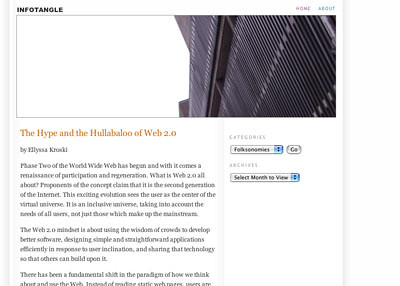To get a fuller understanding, if the concept of tagging is new to you, I recommend Ellyssa Kroski's post, The Hive Mind: Folksonomies and User-Based Tagging at InfoTangle.

To give you the gist, here are some excerpts:
Today, users are adding metadata and using tags to organize their own digital collections, categorize the content of others and build bottom-up classification systems. The wisdom of crowds, the hive mind, and the collective intelligence are doing what heretofore only expert catalogers, information architects and website authors have done. They are categorizing and organizing the Internet and determining the user experience, and it’s working. No longer do the experts have the monopoly on this domain; in this new age users have been empowered to determine their own cataloging needs.
Web 2.0 is about sharing and connectivity and participation. It is a user-centered era of the Web. We are moving away from expert-dictated, exclusionary models of information organization and toward inclusive, participatory ones.
As users continue to add tags, a grassroots organizational scheme begins to emerge which has been dubbed by information architect Thomas Vander Wal, to be a folksonomy. A combination of “folks” and “taxonomy”, the term has come to mean a non-hierarchical ontology that is created as a natural result of user-added metadata or tagging.
The Wisdom of Crowds
There has been much discussion in the information world about the concept of folksonomy as opposed to the traditional taxonomy with its controlled vocabularies and hierarchical nature. Likewise, there have been many advantages identified with respect to folksonomies and organizing web content.
Finally, she says -
Summary
The advantages to top-down hierarchical taxonomies for library collections are without question. For cataloging the Web, however, they just aren’t feasible. The new, “voice of the people” approach of folksonomies emerges at a time when attitudes about information organization and retrieval are shifting and the technology is developing to support them. The opportunities for learning about user behavior as well as the implications for improving and/or complementing existing taxonomies that these systems can provide are of no small import. We are on the cusp of an exciting new stage of Web growth in which the users provide both meaning and a means of finding through tagging.
Kroski's post is elegantly clear and informative, with academic referencing. To gain a clear understanding of the essentials of tagging, read the whole post!
tags
tagging
folksonomies
Web2.0

No comments:
Post a Comment